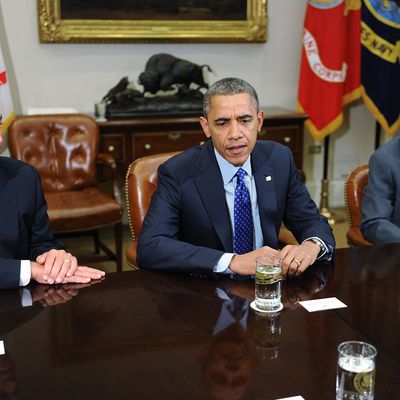
This morning, Mike Allen and Jim VandeHei scooped everybody with a big, exclusive report on the likely budget deal between President Obama and Speaker John Boehner. But when you looked closely at the details of the “agreement,” there is this giant hole:
>Taxes will go up just shy of $1.2 trillion — the middle ground of what President Barack Obama wants and what Republicans say they could stomach. Entitlement programs, mainly Medicare, will be cut by no less than $400 billion — and perhaps a lot more, to get Republicans to swallow those tax hikes.
“Perhaps a lot more”? That doesn’t sound like much of an agreement, since the scope of the welfare state is kind of a big question here. The Washington Post’s report, which presents the negotiations as being at a near impasse, fills in the hole by explaining that Democrats are waiting for Republicans to say what kind of Medicare cuts they want, while Republicans insist Democrats go first.
“Perhaps a lot more”? That doesn’t sound like much of an agreement, since the scope of the welfare state is kind of a big question here. The Washington Post’s report, which presents the negotiations as being at a near impasse, fills in the hole by explaining that Democrats are waiting for Republicans to say what kind of Medicare cuts they want, while Republicans insist Democrats go first.
Democrats argue, not unreasonably, that they’ve put their ask on the table, so Republicans should go ahead and say what it is they want. The standoff here illustrates the asymmetrical bargaining position of the two parties. The simple, “Grand Bargain” model of the negotiation is that Democrats want more taxes, Republicans want less spending, so the logical deal is for them each to give each other something and then you’ve closed the long-term deficit.
But the asks differ in two important ways. First, the Democrats want to reduce the deficit by taxing the rich, which is popular, while the Republicans want unpopular cuts in social insurance programs. Second, the thing Democrats want to happen is scheduled to occur anyway in the absence of any agreement.
This explains the GOP’s reliance on brinksmanship — they hope that the threat of the “fiscal cliff” will scare Obama into bargaining with them, offering political cover for policies the public rejects. But using the fiscal cliff as leverage puts the GOP in the position of defending yet another unpopular policy: raising middle-class taxes. So if we go to January, Republicans are defending the position that taxes on the middle class should rise in order to keep taxes on the rich low in order to cut Medicare. That’s not the way to rehabilitate your party’s image.
The good news for the Republicans is that the Democratic policy establishment has plenty of deficit hawks who recall the Clinton era with pride and are generally well-disposed toward some kind of fiscally conservative budget agreement. They would regard it as a great career accomplishment. Republicans may hate taxes, but in the long run, taxes are going to match spending. So their best play is to take advantage of the Democratic desire for a deal, and get as much spending cuts locked in as they can, since there’s really no plausible way for Republicans to pass big Medicare cuts on their own anytime soon.






























